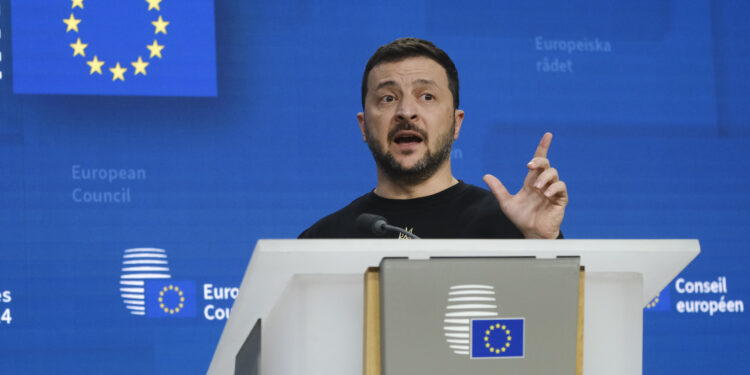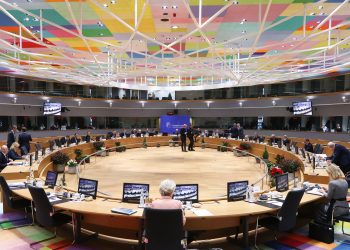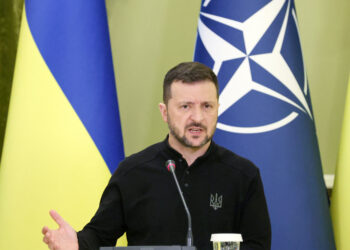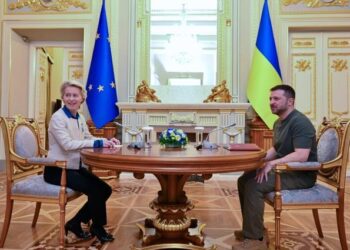Brussels – Ukrainian President Volodymyr Zelensky took part in person in the European Council underway in the EU capital to directly ask the leaders of the Twenty-Seven to continue to support his country and to present his “plan for victory” to the heads of state and government, after having presented it to the Kyiv Parliament yesterday. Among the most significant points of the document is the request to NATO to invite the former Soviet republic as its 33rd member.
The G7 maxi-loan
“Your union is a weapon that provides security for all of us,” Zelensky said as he addressed the morning session of the summit that opened Thursday (Oct. 17). For now, according to the conclusions adopted by EU leaders on the issue of support for Ukraine, the union between the chancelleries is enduring. Especially with regard to the massive loan decided last summer within the G7 framework: €45 billion in all, of which up to 35 will have to be put in by the EU, to be allocated to Kyiv’s coffers and to be financed with the extra profits generated by Russian assets frozen in the West.
For months now, national governments and the EU executive have been trying to defeat the opposition of Hungarian Prime Minister Viktor Orbán, who has repeatedly threatened to kill the deal if Budapest is not granted several waivers regarding energy supplies of Moscow’s hydrocarbons.
Therefore, at today’s summit, it was decided not to decide: the document shared by the heads of state and government simply mentions “the importance of keeping the commitments made” at the summit of 7 in Apulia to get Kyiv the aid it needs “by the end of the year.” But the actual decision will come later, and it will likely require yet another round of persuasion (or compromise) with the Magyar premier to unlock disbursement from the Twenty-Seven.
The “plan for victory”
Zelensky also presented to the EU heads of state and government his five-point “plan for victory“, which he had exposed yesterday to the Verkhovna Rada and of which he had already previewed the most sensitive points—those concerning strategic details, which are secret—with some international partners (France, Germany, Italy, the UK and the US). A plan whose implementation, the Ukrainian president repeated upon arriving at the Europa building in Brussels, “does not depend on Russian will” but “on the will of our partners.”
Talking to reporters at the end of his speech to his European counterparts, Zelensky reiterated that the plan “strengthens Ukraine not only on the battlefield but also on the geopolitical level,” effectively crystallising the positioning of the former Soviet republic in the Western camp. In this sense, he explained, the first priority of the roadmap in question should be understood, namely the call for a formal invitation to join NATO. Even though, in all evidence, actual entry into the Alliance can only occur in the future, after the conflict is over, the invitation to Kyiv would constitute an important political message from the 32 member states.
Kyiv in NATO?
“The invitation is a pre-emptive step,” Zelensky explained, to show that Russian President Vladimir Putin cannot manipulate the international order at will. “This invitation represents a symbol that goes far beyond NATO,” he said, as it indicates “that EU membership will also be inevitable and will confirm the democratic course and reinforce our diplomatic position.”
As an example of Putin’s untrustworthiness, Zelensky recalled the 1994 Budapest Memorandum: under that treaty, Kyiv had transferred all of its nuclear warheads to Russia in exchange for guarantees from Moscow, Washington, and London that Ukraine’s sovereignty and territorial integrity would not be violated. Given the Kremlin’s bad faith—the Ukrainian leader pressed—the alternative for his country is stark: “Either we go back to nuclear weapons, or we have to become part of an effective alliance (military, ed), and NATO is the only one that works” and whose members have avoided wars of aggression since joining. “We are not choosing nuclear weapons; we are choosing NATO,” he said.
On this point, Zelensky has already spoken with the outgoing US President, Joe Biden, and the two candidates for the upcoming November 5 election, Democrat (and current vice president) Kamala Harris and former Republican President Donald Trump. He hinted, though without going into details, that all three are favourable in principle.
European reception of the plan
The Ukrainian president said that “most” European leaders would express “full support for the plan.” Regarding the economic proposals (involving joint investments by Western companies to exploit the attacked country’s natural resources), Zelensky emphasised that they were an “economic security tool” to prevent critical raw materials from falling into Russian hands, as happened a decade ago with the Donbas coal deposits.
Some heads of state and government of the Twenty-Seven are still reticent to allow Kyiv to use its long-range weapons to strike military targets on Russian territory and to give the green light to Ukraine’s accession to NATO. These include German Chancellor Olaf Scholz, who has yet to provide the Ukrainian military with long-range weapons and who, on the Alliance enlargement, “never said no and never said yes,” in Zelensky’s own words.
In the meantime, the Ukrainian leader let it be known that efforts continue to bring the war’s end as close as possible: “Ukraine is ready to take the diplomatic path,” he assured, “but to do so, we must be strong.” “In November,” he added, “we will present a comprehensive document” in ten points as a basis for peace talks, “which we want to share with everyone and also with our Russian counterpart. In the end, the plan for victory that has been discussed is an answer to the question of “how to constrain Russia to diplomacy, to arrive at a just peace.” And if Kyiv’s Western allies continue to support Ukraine and help it implement all the points in the plan, Zelensky estimated, hostilities could end by the end of next year.
English version by the Translation Service of Withub







